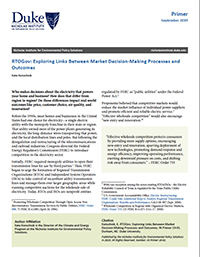Publications
Western Electricity Emerging Markets: State-Level Regulatory Analysis
After decades of failed proposals, the Western United States stands on the precipice of a regionalized electricity market. Current momentum exists in large part because of the success of extant real-time energy imbalance markets, stood up first by the California Independent System Operator in the mid-2010s and more recently by the Southwest Power Pool.
Coalition Stability in PJM: Exploring the Consequences of State Defection from the Wholesale Market
Using a simulation tool, the authors investigate the effects created by a US state defecting from the wholesale electricity market in an organized electric grid on the states that remain in the coalition. The report finds that if a net-importing state defects, the remaining states’ producers are worse off and the remaining states’ consumers are better off. The opposite effect takes hold if the defecting state is a net-exporter. Furthermore, the authors find evidence that defection impacts the remaining states’ climate initiatives.
Participatory Democracy in Dynamic Contexts: a Review of Regional Transmission Organization Governance in the United States
In the United States, electricity law delineates authority across federal and state jurisdictions, yet many essential electricity system functions are organized at a regional-scale. Seven regional transmission organizations (RTOs) ensure open access to transmission, manage wholesale electricity markets, and maintain transmission system reliability. Each RTO has distinct decision-making processes that emerged from political negotiations and regional contexts.
Structural Power in Sustainability Transitions: Case Studies of Energy Storage Integration Into Regional Transmission Organization Decision Processes
Highly technical rules for regional electricity markets shape opportunities for new technologies and the pace of transition to a cleaner and more distributed power system. We compare three case studies of regional transmission organizations and identify common mechanisms that describe the relationship between institutional design and administrative policy decisions.
Reforming FERC’s RTO/ISO Stakeholder Governance Principles
The Federal Energy Regulatory Commission (FERC) has not provided detailed guidance on Regional Transmission Organization (RTO) and Independent System Operator (ISO) governance since Order 719 in 2008; meanwhile, markets have evolved considerably. This article reviews past FERC orders to identify explicit and implied governance principles and criteria to achieve those principles, then proposes additional principles and criteria based on governance problems in PJM Interconnection (PJM).
Comments of RTOGov Researchers to the U.S. Federal Energy Regulatory Commission
This testimony occurred before the U.S. Federal Energy Regulatory Commission by 10 researchers from RTOGov. The researchers suggested that the new Office of Public Participation could help the public in understanding the significance of RTOs and the opportunities to engage in their decision-making processes.
Is the Utility Transmission Syndicate Forever?
Approved by states to act as local monopolists, investor-owned utilities (IOUs) promptly extended their reach by building transmission lines to neighboring utility systems. Transmission links transformed IOUs from statesanctioned service providers to interstate system operators and wholesalers. With overriding control over transmission in their monopoly service territories, IOUs exploited nearby non-profit utilities and regionalized their dominance through collusive agreements with each other that obstructed competition and cartelized infrastructure development.
Rethinking Grid Governance for the Climate Change Era
The electricity sector is often appropriately called the linchpin of efforts to respond to climate change. Over the next few decades, the U.S. electricity sector will need to double in size to accommodate electric vehicles, while transforming to run entirely on clean energy. To drive this transformation, states are increasingly adopting 100 percent clean energy targets. But fossil fuel corporations are pushing back, seeking to maintain their structural domination of the U.S. energy sector.
Evaluating Options for Enhancing Wholesale Competition and Implications for the Southeastern United States
Given stated stakeholder clean energy and consumer goals, this paper offers a way to evaluate options for enhancing competition, compared to how utilities traditionally operate the electricity grid. The focus here is on wholesale transactions between generators and utilities serving end-use customers. These utilities then sell electricity at retail to their customers, and in many regions including the Southeast, they are state-regulated monopolies responsible for serving their customers at least cost.
Competition Case Study—The Southern Grids: 2000–2006
This case study lays out the four Southern proposals submitted to FERC, and chronicles how this directive played out in the South. In a sidebar, the case study also describes the retail competition vision being explored in North Carolina during the same time period. While the Southern Grids did not launch, the GridSouth (in the Carolinas) and the GridFlorida proposals reflect a concerted effort by the participating utilities to explore market creation, as well sustained engagement – and some support – by regulators and stakeholders.
RTOGov: Exploring Links Between Market Decision-Making Processes and Outcomes
The RTOGov project seeks to explore the links between decision-making processes and outcomes in our power markets. Led by researchers at Duke University and funded through a generous grant from the Alfred P. Sloan Foundation, RTOGov is a growing network of researchers exploring the most important decision-making bodies never heard of in the United States.
Testimony Before the Select Committee on the Climate Crisis— U.S. House of Representatives
Jennifer Chen, Senior Counsel with the Nicholas Institute for Environmental Policy Solutions at Duke University, testifies before the U.S. House of Representatives' Select Committee on the Climate Crisis on June 26, 2019, about how wholesale electricity markets regulated by FERC and operated by regional transmission organizations (RTOs) are a key puzzle piece to decarbonizing the U.S. power sector.












